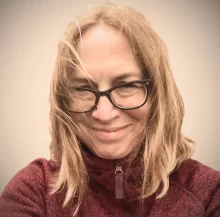Last week, I posted the Recovery Voices Teaser I edited for James Deakin, Founder of North Wales Recovery Communities (NWRC) which is located in Bangor, North Wales. This film quickly became the most viewed Recovery Voices film clip. The Teaser was created from an interview that James had with his good friend Wulf Livingston, who is my co-founder of the Recovery Voices initiative.
I was really excited to recently interview James, as part of a follow-up series to Wulf’s interview. I have now edited eight films from that first Zoom interview, summaries and links of which you can find here.
I decided to show this particular clip first, in which James describes how he was incredibly intimidated by academics initially. However, he later learnt that there was no need to be intimidated—he could play an important role in the addiction recovery field. And so he has! Mark Gilman played an important role here. How many times have I heard this of Mark? He has inspired many!

 I am really pleased to introduce the fourth of our Recovery Voices,
I am really pleased to introduce the fourth of our Recovery Voices,  In the third of our
In the third of our  I just wanted to remind you about our
I just wanted to remind you about our 
